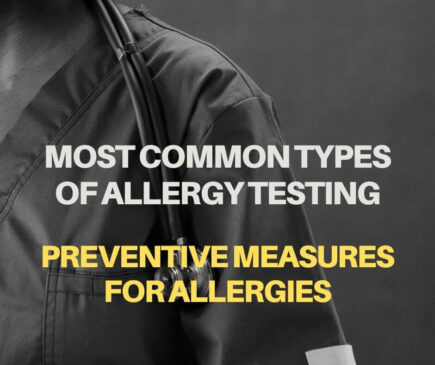In a diverse and vibrant country like India, allergies have become increasingly prevalent due to various environmental factors, lifestyle changes, and genetic predispositions. Allergies can significantly impact an individual’s quality of life, affecting their physical and emotional well-being. To address this growing health concern, allergy testing and prevention play a crucial role in helping people identify triggers and adopt measures to lead a healthier, allergy-free life. In this blog post, we will delve into the importance of allergy testing, explore different testing methods, and highlight preventive measures that can be incorporated into health checkups to ensure optimal well-being for Indians.
FAQ on Allergy Testing & Its Prevention
Allergy testing is a vital diagnostic tool used by healthcare professionals to identify specific allergens responsible for triggering adverse reactions in individuals.
1: Most common types of allergy testing
a. Skin Prick Test: In this painless procedure, a small amount of allergen is applied to the skin, usually on the forearm or back. The skin is then gently pricked to allow the allergen to enter the skin’s surface. If an allergic reaction occurs, a raised bump or redness will appear.
b. Blood Test (Allergen-specific IgE Test): This test measures the level of allergen-specific IgE antibodies in the blood. It is particularly useful for individuals who cannot undergo skin testing due to skin conditions or certain medications.
c. Patch Test: Patch testing is performed to identify contact allergies caused by substances that come into contact with the skin, such as metals, chemicals, or latex.
The Importance of Health Checkups:-
Regular health checkups are crucial for overall well-being, as they allow early detection of various health conditions, including allergies. During a comprehensive health checkup, a doctor may inquire about allergy symptoms and recommend appropriate allergy testing based on an individual’s medical history and risk factors.
A: Allergy testing is a diagnostic procedure used to identify specific substances, known as allergens, that trigger an allergic reaction in an individual. It helps to determine the cause of allergic symptoms and aids in developing an appropriate treatment plan.
A: Allergy testing can be conducted in several ways, including skin prick tests, blood tests (such as IgE antibody tests), and patch tests. Skin prick tests involve placing small amounts of allergens on the skin and observing for a reaction. Blood tests measure the presence of specific antibodies in the blood, indicating an allergic response.
A: Common allergens tested for include pollen, dust mites, pet dander, mold spores, certain foods, insect venom, and medications. The specific allergens tested depend on the individual’s symptoms and suspected triggers.
A: Before undergoing allergy testing, it is important to inform your healthcare provider about any medications you are taking, as certain medications can interfere with test results. Additionally, if you have a history of severe allergic reactions, your healthcare provider may take precautions to ensure your safety during the testing process.
A: Allergy testing itself does not prevent allergies. However, it helps identify specific allergens that trigger allergic reactions, enabling individuals to take preventive measures and avoid exposure to those allergens. By avoiding known triggers, individuals can minimize the frequency and severity of allergic reactions.
A: While specific preventive measures may vary depending on the allergen, here are some general tips to help reduce the risk of allergies:
Avoid allergens: Once identified through allergy testing, take steps to minimize exposure to known allergens. This may include using allergen-proof covers for bedding, keeping indoor spaces clean and well-ventilated, and avoiding known triggers such as certain foods or pet dander.
Manage indoor air quality: Keep indoor spaces clean, reduce dust mites, and control humidity levels to prevent the growth of mold and mildew.
Practice good hygiene: Wash hands frequently, especially after coming into contact with potential allergens, such as pet fur or pollen.
Consider immunotherapy: Allergy shots or sublingual immunotherapy may be recommended for individuals with severe allergies. These treatments involve gradually exposing the body to small amounts of allergens to desensitize the immune system.
Consult with a healthcare professional: If you suspect you have allergies or are experiencing symptoms, consult with a healthcare professional for proper diagnosis, treatment, and guidance on preventive measures.
Preventive Measures for Allergies:
- Awareness and Education: Educating the public about common allergens, symptoms, and prevention strategies is essential. Creating awareness can help individuals recognize potential triggers and take necessary precautions.
- Allergen Avoidance: Identifying and avoiding allergens is crucial in managing allergies. Implementing lifestyle changes, such as using allergen-proof covers for mattresses and pillows, regularly cleaning homes to reduce dust and mold, and keeping pets away from certain areas, can be beneficial.
- Seasonal Precautions: During high pollen seasons, it is advisable to check pollen forecasts and limit outdoor activities when pollen counts are high. Taking a shower and changing clothes after being outdoors can help remove pollen from the body.
- Dietary Considerations: For individuals with food allergies, reading food labels diligently and informing restaurant staff about allergies are essential practices to prevent accidental exposure.



